Hello and welcome to Episode 62 of Read Paradise Lost with me, Jane Davis, a podcast and Substack newsletter about my project to read all of Paradise Lost by John Milton, aloud, and with a sometimes word-by-word, sometimes line-by-line discussion. This is a one-take recording with no editing, so forgive noise of seagulls, my coughing, or sound of men drilling next door. Rough and ready reading is what you get.
See Episode 1 for an introduction to the project.

We’re reading just over 100 lines this week, as we listen to Adam respond to Eve’s dream, and see the primal couple start their day with spontaneous prayer. I’ll be reading in several chunks.
Adam begins with sympathy and a small thought about where evil comes from;
Best Image of my self and dearer half, [ 95 ]
The trouble of thy thoughts this night in sleep
Affects me equally; nor can I like
This uncouth dream, of evil sprung I fear;
Yet evil whence? in thee can harbour none,
Created pure. But know that in the Soule [ 100 ]
Are many lesser Faculties that serve
Reason as chief; among these Fansie next
Her office holds; of all external things,
Which the five watchful Senses represent,
She forms Imaginations, Aerie shapes, [ 105 ]
Which Reason joyning or disjoyning, frames
All what we affirm or what deny, and call
Our knowledge or opinion; then retires
Into her private Cell when Nature rests.
Oft in her absence mimic Fansie wakes [ 110 ]
To imitate her; but misjoyning shapes,
Wilde work produces oft, and most in dreams,
Ill matching words and deeds long past or late.
Som such resemblances methinks I find
Of our last Eevnings talk, in this thy dream, [ 115 ]
But with addition strange; yet be not sad.
Evil into the mind of God or Man
May come and go, so unapprov'd, and leave
No spot or blame behind: Which gives me hope
That what in sleep thou didst abhorr to dream, [ 120 ]
Waking thou never wilt consent to do.
Can Adam really be affected ‘equally’, as he says, by the disturbance of Eve’s dream? He feels for her, certainly, but he is outside the experience, and able to view it with some intellectual curiosity.
nor can I like
This uncouth dream, of evil sprung I fear;
Yet evil whence?
The evil cannot have arisen in Eve, he believes, because she has been ‘created pure’. This may give us pause for thought. Is it true? And if it is, has God the Creator changed his way of creating? Were the Angels created pure? Sin came from Satan, was born from his head. Was Satan not created pure?
Adam continues to think it out. Perhaps this was not evil but simply a natural phenomenon of the sleeping mind.
But know that in the Soule [ 100 ]
Are many lesser Faculties that serve
Reason as chief; among these Fansie next
Her office holds; of all external things,
Which the five watchful Senses represent,
She forms Imaginations, Aerie shapes, [ 105 ]
Which Reason joyning or disjoyning, frames
All what we affirm or what deny, and call
Our knowledge or opinion; then retires
Into her private Cell when Nature rests.
Oft in her absence mimic Fansie wakes [ 110 ]
To imitate her; but misjoyning shapes,
Wilde work produces oft, and most in dreams,
Ill matching words and deeds long past or late.
A theory of dreaming, the mind’s action ‘when Nature rests’, may account, as Adam says, for the dream. The problem of the genesis of evil has been left aside. The dream arose from the disturbance of their previous conversations (Book4).
Som such resemblances methinks I find
Of our last Eevnings talk, in this thy dream, [ 115 ]
But with addition strange; yet be not sad.
Evil into the mind of God or Man
May come and go, so unapprov'd, and leave
No spot or blame behind: Which gives me hope
That what in sleep thou didst abhorr to dream, [ 120 ]
Waking thou never wilt consent to do.
Adam seems sure of his ground in this most extraordinary assertion: ‘Evil into the mind of God or Man/May come and go, so unapprov'd, and leave/No spot or blame behind’. It may be that Adam has learned this during his conversations with the Angels who visit the garden ( as we will learn) to talk with him. But the existence of evil as something which may ‘come and go’ is not quite as extraordinary as the passing thought that this coming and going can take place in the mind not only of Eve, of Man, but also of God.
Fowler’s edition contains a note which says that ‘God’ here probably means ‘Angel’ but I wonder if it only means Angel. If evil exists as a force in the cosmos - rather as uncreated Chaos exists, as God the Creator, an eternal presence, then…there are implications for Milton’s Christianity. We will come back to this.
Dartmouth Online edition also notes
Adam invokes much the same principle to defend himself against Raphael's implicit accusation, in book 8. 608-11, that Adam has succumbed in passion to Eve's beauty. Even more to the point, Adam's explanation of how evil thoughts and temptations can come into one's mind and leave no trace of sin resembles quite closely Augustine's meditations on sexy dreams and nocturnal emissions in his Confessions 30.41.
As a piece of modern psychological theory the assertion feels true - and a lot rests on ‘so unapprov’d.’ In Satan’s case, evil thoughts did cross his mind (why should God be Top Dog, why not me?) but he did approve them. (See the birth of Sin, Book2, lines 746-759). Why? Because God the Creator creates beings free to choose, rather than pre-determinedly good.
Adam is content to believe that Eve’s dream is just a dream and she won’t follow up with any choice that is hinted at by the dream. He comforts her now, and encourages her to start the day;
Be not disheart'nd then, nor cloud those looks
That wont to be more chearful and serene
Then when fair Morning first smiles on the World,
And let us to our fresh imployments rise [ 125 ]
Among the Groves, the Fountains, and the Flours
That open now thir choicest bosom'd smells
Reservd from night, and kept for thee in store.
So cheard he his fair Spouse, and she was cheard,
But silently a gentle tear let fall [ 130 ]
From either eye, and wip'd them with her haire;
Two other precious drops that ready stood,
Each in thir Chrystal sluce, hee ere they fell
Kiss'd as the gracious signs of sweet remorse
And pious awe, that feard to have offended. [ 135 ]
A couple after a difficult time, after a disturbing dream, after a hint that things may be wrong. It is helpful, in coupledom that one is able to cheer the other, when needed. Milton uses the word - cheerful, cheard, cheard - three times but this determined cheerfulness cannot prevent tears leaking from her eyes. I am troubled by the ‘But’ at line 130. Cheered but still crying. Some trouble here that cheer cannot quite overcome. Trouble that Eve seems shamed by, wiping those tears with her hair. But still they come. Adam kisses these tears away, ‘as the gracious signs of sweet remorse/
And pious awe, that feard to have offended’.
Which they may be.
But also they may be a sign of inner turbulence.
However, that moment is calmed now by their stepping out into the morning, and looking East to the rising sun, ‘began/thir orisons.’
So all was cleard, and to the Field they haste.
But first from under shadie arborous roof,
Soon as they forth were come to open sight
Of day-spring, and the Sun, who scarce up risen
With wheels yet hov'ring o're the Ocean brim, [ 140 ]
Shot paralel to the earth his dewie ray,
Discovering in wide Lantskip all the East
Of Paradise and Edens happie Plains,
Lowly they bow'd adoring, and began
Thir Orisons, each Morning duly paid [ 145 ]
In various style, for neither various style
Nor holy rapture wanted they to praise
Thir Maker, in fit strains pronounc't or sung
Unmeditated, such prompt eloquence
Flowd from thir lips, in Prose or numerous Verse, [ 150 ]
More tuneable then needed Lute or Harp
To add more sweetness, and they thus began.
Milton’s enormous, changeable poem moves from deep emotional recognition of distress in Eve to a poking jibe at a priestly caste who insist on formally set prayers! In the beginning, he shows, there was no such thing. Adam and Eve just say what they want to say in whatever style suits them.
These are thy glorious works, Parent of good,
Almightie, thine this universal Frame,
Thus wondrous fair; thy self how wondrous then! [ 155 ]
Unspeakable, who sitst above these Heavens
To us invisible or dimly seen
In these thy lowest works, yet these declare
Thy goodness beyond thought, and Power Divine:
Speak yee who best can tell, ye Sons of Light, [ 160 ]
Angels, for yee behold him, and with songs
And choral symphonies, Day without Night,
Circle his Throne rejoycing, yee in Heav'n,
On Earth joyn all ye Creatures to extoll
Him first, him last, him midst, and without end. [ 165 ]
From his works, we know him, Milton believes. ‘This universal frame’ implies a maker with ‘Power Divine' and every thing on Earth sings him. I am struck by how much Milton loves Earth, sees God in it. I am thinking of Wordsworth reading this, and seeing now how despite Milton’s huge theological constructions, which feel so antithetical to Wordsworth’s sensibility yet this - seeing the created natural world - is a point at which Wordsworth and Milton touch souls.
Adam and Eve continue, calling to the cosmic elements one by one;
Sun
Fairest of Starrs, last in the train of Night,
If better thou belong not to the dawn,
Sure pledge of day, that crownst the smiling Morn
With thy bright Circlet, praise him in thy Spheare
While day arises, that sweet hour of Prime. [ 170 ]
Thou Sun, of this great World both Eye and Soule,
Acknowledge him thy Greater, sound his praise
In thy eternal course, both when thou climb'st,
And when high Noon hast gaind, and when thou fallst.
And Moon;
Moon, that now meetst the orient Sun, now fli'st [ 175 ]
With the fixt Starrs, fixt in thir Orb that flies,
And yee five other wandring Fires that move
In mystic Dance not without Song, resound
His praise, who out of Darkness call'd up Light.
And Aire;
Aire, and ye Elements the eldest birth [ 180 ]
Of Natures Womb, that in quaternion run
Perpetual Circle, multiform; and mix
And nourish all things, let your ceasless change
Varie to our great Maker still new praise.
Mists:
Ye Mists and Exhalations that now rise [ 185 ]
From Hill or steaming Lake, duskie or grey,
Till the Sun paint your fleecie skirts with Gold,
In honour to the Worlds great Author rise,
Whether to deck with Clouds th' uncolourd skie,
Or wet the thirstie Earth with falling showers, [ 190 ]
Rising or falling still advance his praise.
Winds, Trees, Birds;
His praise ye Winds, that from four Quarters blow,
Breathe soft or loud; and wave your tops, ye Pines,
With every Plant, in sign of Worship wave.
Fountains and yee, that warble, as ye flow, [ 195 ]
Melodious murmurs, warbling tune his praise.
Joyn voices all ye living Souls; ye Birds,
That singing up to Heaven Gate ascend,
Bear on your wings and in your notes his praise;
All creatures, and us;
Yee that in Waters glide, and yee that walk [ 200 ]
The Earth, and stately tread, or lowly creep;
Witness if I be silent, Morn or Eeven,
To Hill, or Valley, Fountain, or fresh shade
Made vocal by my Song, and taught his praise.
And finally, they look back to God;
Hail universal Lord, be bounteous still [ 205 ]
To give us onely good; and if the night
Have gathered aught of evil or conceald,
Disperse it, as now light dispels the dark.
I note ‘to give us onely good’ and the strong presence of good in the dawn in Adam and Eve’s appreciative prayer. If the night has ‘gathered aught of evil’, they pray ‘disperse it’. And the prayer is effective, not, as we know, in the dispersal, but in the calm it brings to them.
So pray'd they innocent, and to thir thoughts
Firm peace recoverd soon and wonted calm. [ 210 ]
Interesting to note that both of them recover ‘firm peace’. When she was crying, when he way kissing her tears away, it may have seemed only Eve who was disturbed. But now I see that, perhaps, after all, Adam was as shaken as she was by Eve’s dream.
More next week.







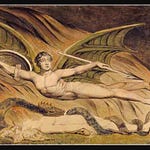

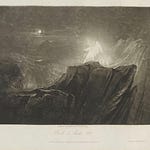
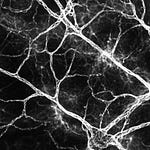
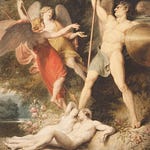
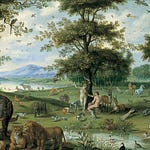
Share this post